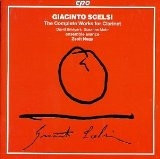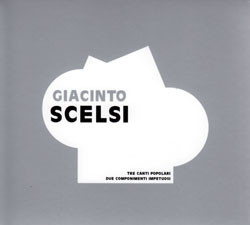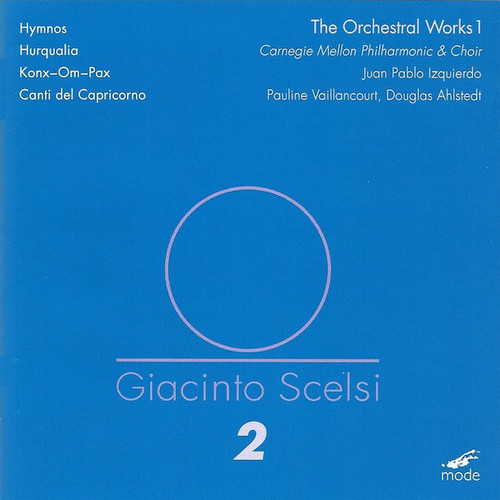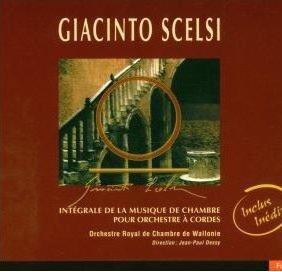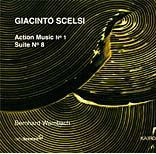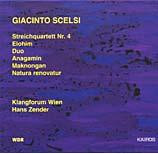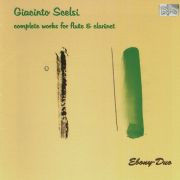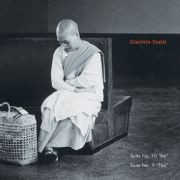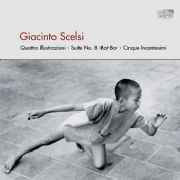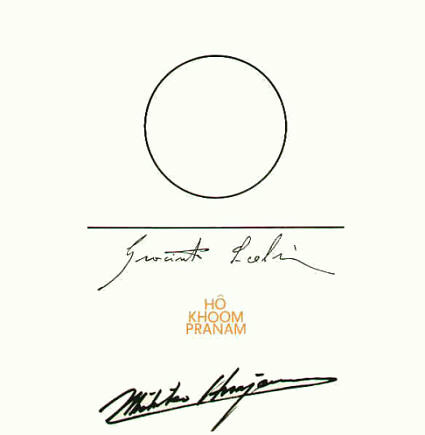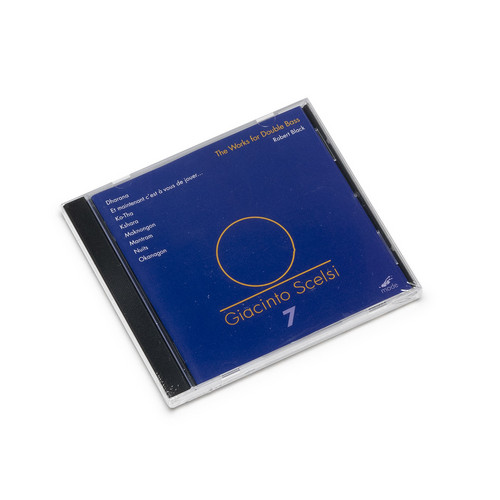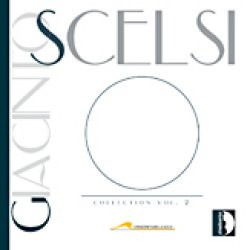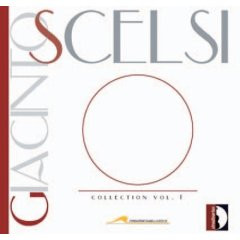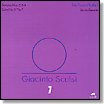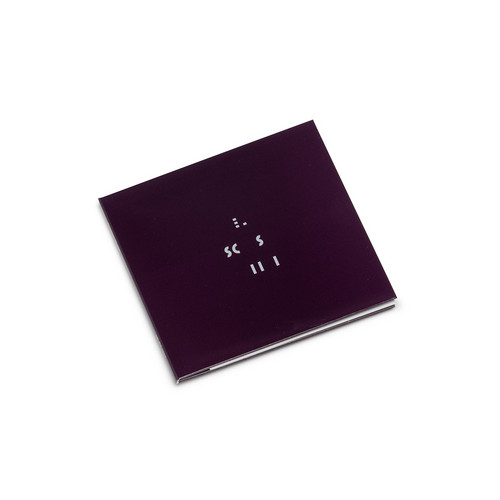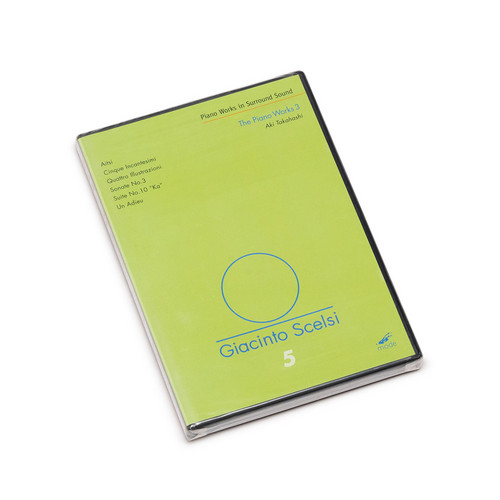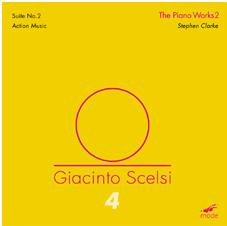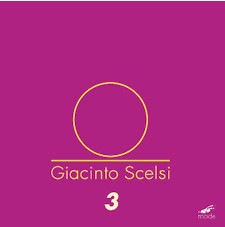Giacinto Scelsi
Giacinto Scelsi was an Italian composer who also wrote surrealist poetry in French. He is best known for writing music based around only one pitch, altered in all manners through microtonal oscillations, harmonic allusions, and changes in timbre and dynamics, as paradigmatically exemplified in his revolutionary Quattro Pezzi su una nota sola ["Four Pieces on a single note"] (1959). His musical output, which encompassed all Western classical genres except scenic music, remained largely undiscovered even within contemporary musical circles during most of his life, until a series of concerts in the mid to late 1980s finally premièred many of his pieces to great acclaim, notably his orchestral masterpieces in October 1987 in Cologne, about a quarter of a century after those works had been composed and less than a year before the composer's death (he was able to attend the premières and personally supervised the rehearsals)
Giacinto Scelsi was an Italian composer who also wrote surrealist poetry in French. He is best known for writing music based around only one pitch, altered in all manners through microtonal oscillations, harmonic allusions, and changes in timbre and dynamics, as paradigmatically exemplified in his revolutionary Quattro Pezzi su una nota sola ["Four Pieces on a single note"] (1959). His musical output, which encompassed all Western classical genres except scenic music, remained largely undiscovered even within contemporary musical circles during most of his life, until a series of concerts in the mid to late 1980s finally premièred many of his pieces to great acclaim, notably his orchestral masterpieces in October 1987 in Cologne, about a quarter of a century after those works had been composed and less than a year before the composer's death (he was able to attend the premières and personally supervised the rehearsals)
Complete Works For Clarinet
Giacinto Scelsi was both reclusive and inexact in the way that he dated and named his compositions. This rendition of Tre Pezzi (a broad title Scelsi used numerous times for different pieces) focuses on narrow ranges in the B-flat clarinet, demonstrating the thin margin of tonal range between the phrases that come sometimes fast, sometimes slow. Kho Lho, on the other hand, pairs a clarinet and flute duet so closely that the instruments' tones merge into a thick strand of sound. Maknongan is a r…
Tre Canti Popolari + Due Componimenti Impetuosi
2CD collection which re-releases two previous Sub Rosa CDs Tre Canti Popolari (SR 051CD, 1992) and Due Componimenti Impetuosi (SR 063CD, 1995), now remastered and with a new design. This is the vocal and piano music of visionary Italian composer Giacinto Scelsi (1905-1988). Performed by: Marianne Pousseur, Lucy Grauman, Vincent Bouchot, Paul Gerimon, Georg Alexander Van Dam, Jean-Paul Dessy, Jean-Luc Fafchamps, and Johan Bossers. Scelsi will always be known as an atypical composer. Throug…
The orchestral works 1
'Hymnos' (1963) for organ & 2 orchestras. 'Hurqualia' (1960) for large orchestra. 'Konx-Om-Pax' (1968) for large orchestra & chorus. The Carnegie Mellon Philharmonic & Concert Choir. Juan Pablo Izquierdo, conductor. 'Canti del Capricorno' for voices & instruments. Pauline Vaillancourt, soprano. Douglas Ahlstedt, tenor. Volume 2 in Mode's scelsi Edition presents three of his rarely heard and recorded orchestral works, vividly captured in outstanding sound. Hymnos' large orchestra is divided antip…
Integrale de la musique de chambre
Long deleted, this is a must have cd collecting all the Scelsi pieces for string orchestra. "An internal struggle, stemming from the introductory tremolo, all through its serene yet chaotic means of lumonisity"
Canti Del Capricorno
Original copy, the title of Scelsi's song cycle possibly refers to the fact that the sign of the Capricorn corresponds with an area of the Earth stretching from India to South America and includes, most significantly, the Amazon. The Amazon, as Scelsi noted, is a place where a pre-historic human culture survives. Scelsi's Songs (19) of the Capricorn, reduce the concept of "song" to poetically loaded vocal utterances imaginatively recalling the conditions of music and language in humankind's dist…
Action Music
Giacinto Scelsi’s relationship with the piano is interesting and contradictory. For no other instrument has the Italian composer and poet composed so many pieces; to no other instrument does he seem so closely attached, both personally and biographically; and no other instrument disappeared so abruptly and finally from his scores as the piano, the European showcase instrument. With the piano, we can follow the break lines and develop-ments in the musical thinking and works of Giacinto Scelsi, wh…
Natura renovatur
Giacinto Scelsi (1905-88) has featured prominently in my music writing life for a decade and a half, ever since I wrote Discovering Scelsi on my first computer for Piano Journal (Oct. 1986), one of the first UK articles about this fascinating and elusive composer.There are particular reasons why the Scelsi CD in the latest, indispensable batch from Kairos prompted a trawl of my files. Scelsi applauded my analysis of his piano music and we had a cordial correspondence, after which I met him tw…
Complete Works for Flûte and Clarinet
The Complete Works for Flute and Clarinet: In both original works and transcriptions, the Ebony Duo explores Scelsi’s use of special sound colors and his coloring of sound. Transcriptions especially prepared by the clarinetist (and pianist) Michael Raster provide the basis for some of the works on the present album. Yet Scelsi’s original intentions incurred no damage as a result of this recrafting. To the contrary! “The formidable technical demands that playing on two strings with in part opposi…
Suite N° 10 \"Ka\" / Suite N° 9 \"Ttai\"
Scelsi's works usually originated as transcribed improvisations; therefore they are never based on superficialities of form or compositional technique but always directly reveal the core of their message. Pianist Marianne Schroeder reports that Scelsi recommended daily improvisational practice as a method for discovering one's own creativity; and on his Suite No. 9 "Ttai" the composer is said to have commented: "Play it whenever you're sad. And when you're in high spirits." In Ttai, which links …
Quattro illustrazioni / Suite N° 8 \"Bot-Ba\" / Cinque incantesi
Crazy about the sound: the composer as a medium fHis bizarre way of composing earned Giacinto Scelsi not only fame and respect; he was also mockingly accused of dilettantism. Scelsi regarded himself not as a composer in the traditional sense, i.e. one to combine form, rhythm, pitch and sound in an intelligent way and note the result down on paper, but as a tool. His music was created during periods of meditative contemplation recorded by him on tape, to be noted down only afterwards. Eastern rel…
Ho Khoom Pranam
an original copy of an awesome Scelsi LP, featuring Hô (1960) - Four melodies for solo voices. Pranam I (1972) - (In memory of the tragic loss of Jani and Sia Christou) for voice, 12 instruments and tape. Khoom (1962) - (Seven episodes of a story of love and death in a distant land) for voice and 6 instruments. Hô and Khoom were recorded in 1960-1962: Pranam I, in 1972.
The works of double bass
This disc contains the first complete recordings of Giacinto Scelsi's music for double bass. Volume 7 in Mode's acclaimed Scelsi Edition. Scelsi's infamous 'KO-THA I, II, Ill' -- for string instrument played lying on its back in a percussive manner -- is presented for the first time in an adaptation from the original for guitar by legendary bassist Fernando Grillo. Robert Black, internationally known as one of the leading bassists of our time, has also collaborated or performed with a diverse nu…
Pranam II for ensemble
It is scored for two flutes, violin, viola, cello, bass clarinet and electric organ. This is a really beautiful piece of tranquil music, full of touching sweetness.
Collection vol.1
The first in a series of recordings devoted to the music of Giacinto Scelsi, devised by Stradivarius in conjunction with the Isabella Scelsi Foundation. The series comprises new, original recordings made in 2005, marking the hundredth anniversary of the composer's birth.
The Piano Works 1
Performed by Louise Bessette (piano). "This marks not only the first volume in Mode's new Scelsi edition, but also the initial disc of the traversal of his piano works. Written in 1939, Scelsi's 'Second Sonata' was premiered by Yvar Mikhashoff in London (1979). Marking a new compositional direction, Scelsi suspended thematic development and frequently introduced various kinds of repetitions: reiterated single tones, chords, and patterns, often suggesting the sounds of bells or Oriental gongs. Sc…
Giacinto Scelsi
**Comes in glossy gatefold sleeve with 20-page booklet ** Features 6 works by the influential Italian avant-gardist of the 20th century, dating from 1961-1990. Pranam I (for voice, 12 instruments and tape, 1972); Anagamin. Celui qui choisit de revenir ou pas (for 12 strings, 1965); Quattro pezzi su una nota sola (for chamber orchestra, 1959); Quartetto n. 4, (1964); Okanagon (Tam Tam and double bass, 1968); Quartetto n. 2 (1961). "For Giacinto Scelsi, music was above all a manifestation of the e…
The piano works 2
Volume 2 in Mode's Scelsi Edition presents three of his rarely heard and recorded orchestral works, vividly captured in outstanding sound. Hymnos (1963) for large orchestra, Hurqualia (1960) for large orchestra, Konx-Om-Pax (1968) for large orchestra & choir, Canti del Capricorno (1962-72), selections, for voice with instruments. The Carnegie Mellon Philharmonic & Choir, Juan Pablo Izquierdo, conductor. Written when the composer was 25, this work bonds Scriabinesque flourishes with dance-hall pr…
Music For High Winds
"Ixor" (1956, for clarinet), "Suite" (1953, for flute + clarinet), "Pwyll" (1954, for flute), "Tre Pezzi" (1954, for Eb clarinet), "Rucke di Guck (1957, for Piccolo + oboe), "Preghiera per un' ombra (1954, for clarinet), "Ko-Lho" (1966, for flute + clarinet), "Three Latin Prayers" (1970, for Eb and A clarinet). "This recording presents pieces for woodwind instruments played solo or in duo. The majority date from the 50's, when Scelsi abandoned his classical and 12-tone training to undertake a re…
